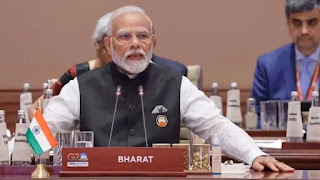The G20 summit in India has reached a joint declaration, including a statement on the war in Ukraine. The leaders denounced the use of force for territorial gain but stopped short of directly criticizing Russia. The Ukrainian government said the statement was "nothing to be proud of". The summit also discussed global issues, including climate change and the debt burden of developing countries.
The Delhi declaration appears designed to allow both the West and Russia to find positives, but it has used language that is not as strong in its condemnation of Moscow as it was in Bali last year. The declaration does not directly criticize Russia for the war but does talk about "the human suffering and negative added impacts of the war in Ukraine with regard to global food and energy security". It also repeated the acknowledgement of "different views and assessments".
The declaration specifies "the war in Ukraine" rather than "the war against Ukraine." This choice of words could have increased the likelihood of Russia endorsing of the declaration. Ukraine, which took part in the Bali summit, was not invited this year, and its response to the declaration has been critical. It is hard for Kyiv to see the dropping of any reference to Russian "aggression" as anything but a sign that its Western backers are losing the argument with the "global South" over how to characterise the war.
The other big news came when Modi formally invited the African Union (AU) to become a permanent member of the G20. Delhi prioritised elevating the voices of these nations as the foundation of its presidency, and in the near future, it is poised to reap the rewards of this strategic choice as it vies with China for influence across Asia and Africa.
Climate change was another hotly discussed topic. At the ministerial level meetings in the run-up to the summit, there had been no agreement on the issue. Now officials say they have reached "100% consensus". There has been evident give-and-take on climate in the declaration. The G20 countries will pursue and encourage efforts to triple renewable energy capacity globally through existing targets and policies. Experts have also emphasised the importance of the Green Development Pact, a plan to tackle the environmental crisis through global co-operation over the next decade. G20 countries have pledged to work together to enable low-cost financing for developing countries to support their transitions to low emissions.







0 comments:
Post a Comment